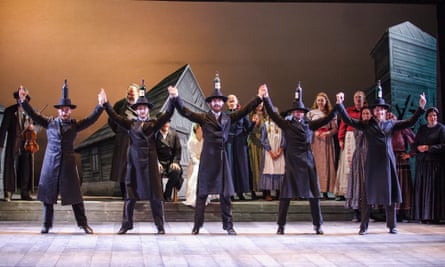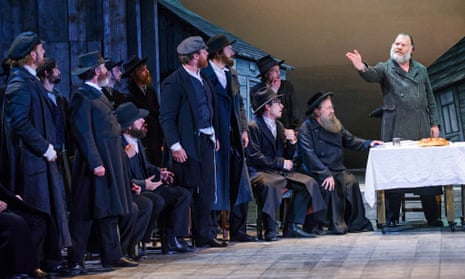While opera companies put on musicals at their own artistic risk, Grange Park has form in this area: productions of Anything Goes and Wonderful Town have gone well at this address, though a more recent attempt at South Pacific was less successful.
Now the company presents what it describes as “possibly our most ambitious production ever”, with a revival of the 1964 Jerry Bock/Sheldon Harnick Broadway hit based on short stories by the Yiddish writer Sholem Aleichem.
The Hampshire festival has acquired an authentic star for the lead role of Tevye the dairyman in the shape of operatic bass-baritone Bryn Terfel – who also has experience in musical theatre: a few weeks ago he was singing the title role in Sondheim’s Sweeney Todd at the Coliseum.
The Jewish milkman arguably suits him even better than the London barber. Terfel knots together strands of personal warmth, wisdom and bonhomie to construct a complex figure who stops just this side of tragedy. The show’s creators once defined its underlying theme as “the dissolution of a way of life”, and in Terfel’s performance that process is made flesh.

While he was always going to stand out from the crowd, many of Terfel’s colleagues also make their marks. Among them, Janet Fullerlove holds her own as Tevye’s wife, Golde; Charlotte Harwood gives a feisty account of his first daughter, Tzeitel; Anthony Flaum makes her chosen husband, Motel the tailor, distinctly likable; Katie Hall is a Hodel visibly determined to marry Jordan Simon Pollard’s wild-eyed radical, Perchik; Molly Lynch shows the inner strength of third daughter, Chava; while Craig Fletcher draws her Russian partner Fyedka with maximum sympathy and Mark Heenehan explores the equivocal nature of the Tsarist Constable.
Antony McDonald’s wooden sets allow interiors and exteriors to glide seamlessly from one to the other, while his direction is clear and focused. Gabrielle Dalton’s costumes conjure up the inhabitants of a world now no more than a distant memory, while Lucy Burge’s outstandingly executed choreography enlivens a couple of scenes, also making manifest the racial and religious intolerance that is at the heart of the show.
David Charles Abell conducts a vigorous account of a score whose best numbers come in the first act; to add to the aural pleasure of the evening the original, large-scale orchestrations – unthinkable in a commercial revival these days – are vividly conveyed by the BBC Concert Orchestra, and there are no microphones
- In rep at Grange Park, Hampshire, until 3 July. Box office: 01962 737373. Then at the Proms on 25 July.

Comments (…)
Sign in or create your Guardian account to join the discussion